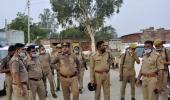'But thereafter the same trend is again getting popular and that is what is disturbing and alarming.'
'If this practice goes unchecked, then the entire edifice of the rule of law which gives protection to citizens of this country would crumble into pieces.'

Delhi advocate Anoop Prakash Awasthi has filed a petition in the Supreme Court seeking direction for a Supreme Court-monitored investigation by either the Central Bureau of Investigation or the National Investigation Agency into the extra-judicial encounters that took place in Uttar Pradesh after Chief Minister Ajay Mohan Bisht aka Yogi Adityanath came to power on March 18, 2017.
The immediate spark for this petition on May 15, 2021 came after three undertrial prisoners were shot dead under suspicious circumstances in the Chitrakoot district jail in UP on May 14.
Awasthi, who is an advocate-on-record of the Supreme Court, speaks with Prasanna D Zore/Rediff.com about the purpose of his public interest litigation and what he seeks to achieve through a Supreme Court-monitored probe.
What are you trying to achieve through your plea requesting the Supreme Court to direct a CBI or NIA investigation into the alleged extra-judicial killings in UP?
(Extra-judicial) encounters cannot be used as state policy. I am basically against the policy of extra-judicial policy of encounter killings that is openly propagated by the Uttar Pradesh police.
I had filed a similar petition in the Vikas Dubey fake encounter case. Ghanshyam Upadhyay's petition was the leading position and my petition was the second petition.
On those (petitions) certain directions were issued (by the Supreme Court) and I sincerely hoped that since the honourable Supreme Court had taken cognisance of the issue of extra-judicial killings, these encounters would certainly go down.
Even these criminals (those killed in alleged extra-judicial killings in Uttar Pradesh) have the protection of Article 21. They are criminals because they have broken certain laws. So, they must be punished legally.
The executive cannot take over the function of the entire judicialFor a few months they did not kill any person, but thereafter the same trend is again getting popular and that is what is disturbing and alarming.
That is why I filed this petition.
If this practice goes unchecked, then the entire edifice of the rule of law which gives protection to citizens of this country would crumble into pieces. system of prosecution and sentencing.
Do you think the Allahabad high court or the Supreme Court should have taken suo motu cognisance of these extra-judicial killings?
I think they should have done that. The advocates in Lucknow and Allahabad are very prompt in taking up all such issues. But there is a reign of terror going on there (in UP).
Earlier, people would file petitions on all sorts of issues that cropped up, but in the last four years I have not seen those activist-advocates filing such pleas against the powers that be.
Even when they did file such pleas, positive results have not been achieved because the due process of law was not followed in those cases.
Your plea alleges that an encounter culture persists in UP. What are the reasons for this?
People are more oriented towards results; they feel that criminals who are caught and go through the judicial prosecution process results in lot of time being wasted and most of the times these criminals go unpunished. So, there is a popular feeling among the people that it is better that they are eliminated on the spot.
Instead of empowering the prosecution machinery, instead of finding solution to the problems of prolonged prosecution, the UP government is provoking the law enforcement agencies to take the law into their own hands.
This is not permissible in a democracy; this should not be done.
What if after due judicial process that person (who has already been eliminated) is found to be innocent? Then you cannot put the clock back. That life is lost.
The other issue is who are we elected as the executive to take over the role enshrined to the judiciary by the Constitution?
Such extra-judicial encounter killings make a mockery of the Constitutional responsibilities given to different organs of the Indian Republic.
This is like an autocratic dispensation where the king is the judge as well as the executioner.
This throws the principle of separation of powers to the dustbin. What about our Constitutional machinery?
These extra-judicial killings are, in fact, an acknowledgement of the breakdown of the Constitutional machinery itself.
The investment of resources, the encouragement should be in the process of supporting the person who is doing rightful investigation and then encourage him to follow the due process of law.
The judiciary too must be invested with technology and human resources to carry out its role at a faster pace.
It is not the problem of our laws. It is the problem of implementation of our laws through the judicial system. So, that larger problem is not addressed.
These ad hoc measures cannot survive for long.
Do you trust the CBI and the NIA to conduct an impartial and fair investigation?
(Laughs). I think these investigative agencies would do a better job under the given circumstances than the UP police.
The UP police, if they were to be asked to conduct an inquiry, would definitely help out their own colleagues (involved in alleged extra-judicial killings).
Impartial probe into these killings by the UP police is almost an impossibility. Our federal structure does not allow the investigation against one state to be carried out by the police of another state. So, I cannot request the court to order a probe by the Punjab police or Kerala or Tamil Nadu police.
So, these (investigating agencies like the CBI and NIA) are the only options.
In your petition you have mentioned that you would fear for your life if the legal proceedings were to happen in Allahabad.
Why do you fear for your life as mentioned in your second plea?
Wouldn't you face a threat to your life even in Delhi?
Whoever wants to harm me can harm me anywhere. But the chances (of that happening in Delhi) are comparatively less.
Moreover, being an advocate-on-record of the honourable Supreme Court, I feel I am under the protection of the honourable Supreme Court. I will have to travel 700-800 km away from my place (Delhi) if I were to go to the Allahabad. That would make it all the more difficult and risky.
You never know what can happen to you when you are taking on the police. You may meet with an accident, you can get into some kind of brawls and then FIRs can be lodged against you and you will be made to run from Delhi to UP for such cases.
I also feel that if I am able to impress upon the Supreme Court about the (court-monitored CBI or NIA) investigation, then I feel the impact of that order will not remain limited to just UP.
It would definitely have a pan-India effect and act as a deterrent to law enforcement agencies across India to act strictly within the purview of the Indian law and Constitution.
What are the important legal issues that your petition has raised?
The core of my entire petition is that the State cannot propagate, either by words, acts or gestures, or by policies, anything that is not permitted by law.
Killing is not permitted by law. You cannot order anybody's killing outside the due prosecution procedures established by the law.
If you are not doing that, then you are overstretching your executive powers and engaging in extra-judicial killings.
The moment such extra-judicial killings become a norm, backed by the political executive, the police or any other law enforcement agency per se, will take it as if they have a free hand.
There is nothing to stop these agencies to brand you a criminal within minutes, file five different cases in five different police stations, and that would make some SHO or police inspector the master of your life.
Such a sorry state of affairs would make the life of ordinary Indian citizens miserable.
India is not that kind of lawless country. India's laws are based upon Constitutional values and if we wish to survive (as a country) for the next thousand years we should remain as such.
This is not about an individual. This is about our institutions and the Constitutional integrity they uphold.










